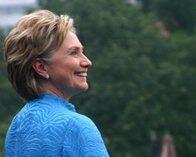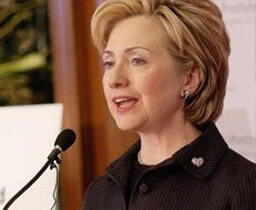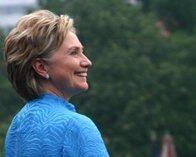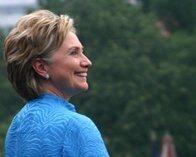Virginia: Clinton Has Slight Edge Over GOP Hopefuls
No Democratic Presidential candidate has won the state of Virginia since 1964, but some analysts believe the state’s Electoral College Votes could be in play during Election 2008.

No Democratic Presidential candidate has won the state of Virginia since 1964, but some analysts believe the state’s Electoral College Votes could be in play during Election 2008.

In Minnesota, Senator Hillary Clinton (D) holds double digit leads over each of the top three Republican Presidential candidates.

Minnesota is likely to host one of the more interesting and competitive Senate races in Election 2008.

The national polls in the race for the Democratic Presidential nomination remain remarkably stable. New York Senator Hillary Clinton remains the frontrunner with support in the 40 percent range and a very solid lead.

Former Senator Fred Thompson first announced that he might be available for the Republican Presidential nomination nearly six months ago.

One of the little noticed results of polling conducted this year is how close virtually every head to head match-up has been between the major Democratic and Republican candidates.

As General David Petraeus prepares his report on the situation in Iraq, most Americans (54%) say that report is not likely to change their views on what should happen next.

Probably the most frequently asked question about Hillary Clinton's candidacy for President is can she win the general election with an unfavorable rating above 45%?

Every primary season contains some discussion of the trade-offs voters consider between a candidate’s position on the issues and their electability.

Worker confidence stumbled in California in August, as the state’s Hudson Employment Index SM fell 8.8 points to 100.3. This is the lowest reading since September 2005. Concern around finances and hiring, as well as lower levels of job satisfaction, triggered the drop. California’s latest monthly measure of worker confidence is more than ten points lower than last August’s reading. The national Index, based on responses from approximately 9,000 workers across the country, also plunged 6.6 points to 99.2.

Worker sentiment has resembled a rollercoaster ride for finance and accounting workers so far this year. After rebounding in July, confidence dropped seven points for this group in August, with their Hudson Employment Index (SM) registering at 113.1. Greater financial concerns drove the decline. The latest reading for this group is virtually the same as last August’s reading of 112.5. The composite Index, based on responses from approximately 9,000 workers across all sectors, plunged 6.6 points in August to 99.2.

Ohio workers were more optimistic for the second consecutive month in August, as the state’s Hudson Employment Index (SM) climbed 2.8 points to 109.6. This is the highest reading for the state in nearly three years. Improved perceptions of finances and less expected job cuts triggered the improvement. The state’s latest Index is more than ten points above last August’s 98.7. The national Index, based on responses from approximately 9,000 workers across the country, plunged 6.6 points to 99.2.

Worker confidence in Pennsylvania declined for the second month in a row in August, as the state’s Hudson Employment Index (SM) slipped 2.2 points to 102. Concerns around finances and job cuts triggered the decline. The state’s latest Index is five points above last August’s reading of 97. The national Index, based on responses from approximately 9,000 workers across the country, plunged 6.6 points to 99.2.

Workers in Texas were slightly less optimistic in August, as the state’s Hudson Employment Index SM slipped 1.4 points to 124.4. Fears around personal finances triggered the decrease. The latest reading is shy of last August’s 126.5. The national Index, based on responses from approximately 9,000 workers across the country, plunged 6.6 points to 99.2.

Dallas worker confidence took a nosedive, as the Hudson Employment Index (SM) fell 11.6 points to 109.1 in August. The city’s latest Index is just over a point shy of last August’s 110.3. The national Index, based on responses from approximately 9,000 workers, plunged 6.6 points to 99.2.

New York City worker confidence rose for the second consecutive month in August, as the city’s Hudson Employment Index (SM) climbed 4.3 points to 97. More expected hiring and improved perceptions of finances contributed to the increase. The city’s latest Index is stronger than last August’s reading of 90.9. The national Index, based on responses from approximately 9,000 workers, plunged 6.6 points to 99.2.

Worker confidence fell in San Francisco for the third month in a row in August, as the city’s Hudson Employment Index (SM) plunged 10.8 points to 95.7. Concerns relating to personal finances and hiring plans caused the decline. San Francisco’s latest Index is lower than last August’s reading of 99.2. The composite Index, which is based on responses from approximately 9,000 workers nationwide, also tumbled 6.6 points in August to 99.2.

Ending a four-month skid, worker confidence rose in Florida in August. The state’s Hudson Employment Index (SM) rose 1.7 points to 94.3 while almost all other geographies reported declines. Florida’s latest measure of worker confidence is dramatically lower than last August, when it registered 122.3. The national Index, based on responses from approximately 9,000 workers across the country, plunged 6.6 points to 99.2.

The Hudson Employment Index (SM) for Los Angeles fell 3.2 points to 96.4 in August. Greater dissatisfaction with finances and fewer hiring expectations were offset by less concern over job loss. The latest reading is below last August’s reading of 102.2. The composite Index, which is based on responses from approximately 9,000 workers nationwide, plunged 6.6 points to 99.2.

After two months of steady increase, the Hudson Employment Index (SM) for Minneapolis-St. Paul fell 6.9 points to 102.6 in August. The Twin Cities’ reading registered 92.1 last August, more than 10 points below the latest Index. The national Index, based on responses from approximately 9,000 workers nationwide, plunged 6.6 points to 99.2.